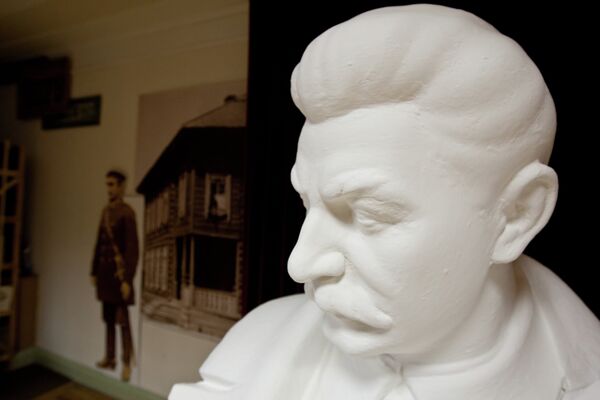KRASNOYARSK, February 14 (RIA Novosti) – Russian communists have unveiled plans to erect a monument to Soviet dictator Joseph Stalin in a Siberian city where he spent time in his final exile before his rise to power, a local lawmaker said Friday.
The monument is planned to be built by next year to mark the 70th anniversary of the Soviet Union’s victory over Nazi Germany in World War II on May 9.
Stalin spent two months in Achinsk near Krasnoyarsk before returning to Petrograd, as St. Petersburg was then known, in March 1917 to join the unrest following the February revolution and the overthrow of Russia’s last tsar.
The Bolsheviks, led by Vladimir Lenin, took control of the country. Stalin replaced Lenin as the leader of the USSR in 1924 and became one of the most notorious dictators of all time.
Historians estimate that Stalin was responsible for the deaths of tens of millions of people in the Soviet Union. The dictator’s most notorious crimes include the forced deportation of entire peoples to remote and sparsely populated areas of the Soviet Union, hundreds of thousands of summary executions during the Great Purge of the 1930s and an agricultural policy that led to a devastating famine in Ukraine.
In Soviet times, the house in Achinsk where Stalin stayed was turned into a museum containing his personal belongings. In the 1950s when the “cult of personality” of Stalin's rule was condemned by the new Soviet leadership, the museum was closed and historical documents destroyed.
The artifacts, which were kept safe by a museum worker, include an ash tray. Achinsk was reportedly the place where Stalin first began smoking a pipe – a habit that became part of the strongman's image.
“Now the memory of Stalin in Achinsk is not immortalized. There is an exhibition at a local museum dedicated to him, but there is no monument … This is bad because students do not know who led the country during the war and who Stalin was. This is wrong,” said Vladimir Sedov, a deputy for the local Communist party.
Construction will go ahead if locals support the plans.
Stalin evokes mixed memories in Russia and the former Soviet republics, particularly in his native Georgia. While given credit for overseeing Russia’s victory in World War II and industrializing the country, he is also remembered for sending millions of people to death in labor camps, and carrying out particularly savage repression in the Caucasus, including Georgia.
Most monuments to Stalin were taken down in the years following his death in 1953. Last year, a statue of the dictator was dismantled months after it was erected in the Georgian city of Telavi, having been vandalized several times, media reported.


